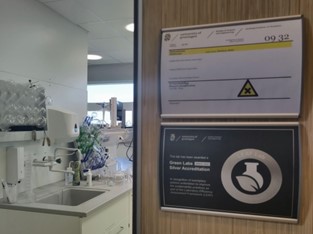Seven labs receive LEAF awards for sustainability
The Faculty of Science and Engineering (FSE) is working towards becoming more sustainable, through different initiatives and working groups, such as The Green Labs group. They focus on reducing waste, energy and water usage in laboratories, using the LEAF programme. Seven labs at FSE have recently received a LEAF award for their efforts - and 32 labs are working towards accreditation.

What is LEAF?
LEAF stands for Laboratory Efficiency Assessment Framework and was created by University College London to help labs become more sustainable. The LEAF toolkit calculates how labs can save water, waste, energy and money. Then, based on the actual savings made, the labs are awarded bronze, silver or gold certificates. The LEAF toolkit is used worldwide, by at least 85 institutions.
Many scientific projects at FSE have a strong link with sustainability contentwise, but laboratory work often produces a large amount of waste, and lab equipment requires a lot of energy. Labs use about 10 times more energy and four times more water than office spaces of the same size1.
Sustainable changes in labs
Energy-saving changes range from using an equipment schedule, turning off machines by default and setting freezers to higher temperatures. Examples of waste-reducing changes are using glass instead of plastic, improving waste recycling and sharing resources and purchases with other labs. These changes sound simple and logical, but a more complex change is needed: “for a large part, LEAF is about mindset,” explains Thomas Freese, LEAF coordinator, “such as turning machines on when you need them, instead of turning them off when you don’t need them.”
Nobel Prize winner Professor Ben Feringa agrees: “Next to finding biomass alternatives for fossil fuels or investigating green energy carriers, it is crucial that such research is also conducted with a certain mindset. The way of how we as researchers obtain materials and data, has to be conducted in the most sustainable way possible. Only then we truly achieve possible sustainable alternatives for our future. The passion of our young scientists accomplishing such progress with Green Labs is remarkable.” From the seven labs that have received a LEAF award, four fall under Professor Ben Feringa’s research groups.
‘FSE is going green’ programme
The Faculty is undertaking many sustainability initiatives and most are supported by the ‘FSE is going green’ programme. Several working groups, consisting of FSE staff and students, are passionately working on a variety of topics, such as logistics, canteens and catering, energy and travel behaviour. The ‘FSE going green’ programme is supported by the UG Green Office.
Read more
Articles about LEAF and Green Labs:
-
Laboratories are going green (Science LinX)
-
Chemistry labs are going green: ‘The drive is in the young generations’ (Ukrant)
-
Labs should be greener (Ukrant)
1Kaye, C. (2020). Media Briefings 2020. #3 Efficiency & Sustainability: Igniting Innovation. https://www.agilent.com/content/dam/about/newsroom/media-room/igniting-innovation/Efficiency-Sustainability-Igniting-Innovation-Media-Briefing.pdf
More news
-
10 February 2026
Why only a small number of planets are suitable for life
-
09 February 2026
Can we make the earth spin in the opposite direction?
